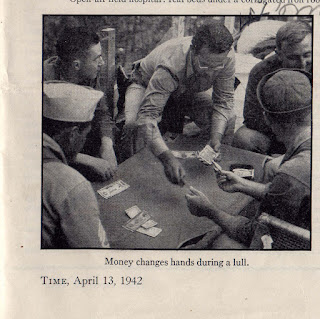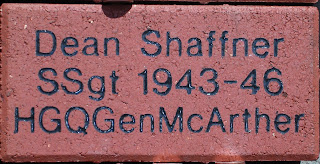A grandson of my great grandfather, Albert Gallatin Lloyd, died in a Japanese POW camp in World War II.
This picture was in LIFE magazine.
"The Waitsburg Times" Lt. Tony Lloyd Dies in Japanese Prison Camp- News Arrives Here of Death on January 7, 1945
A telegram from the War Department has just been received by Mr. and Mrs. Wesley A. Lloyd notifying them of the death of their son, First Lt. Tony Boynton Lloyd in a prison Camp in Japan, January 7, 1943. Tony Lloyd was born at the old farm home west of Waitsburg, March 12, 1915. ................"
Telegram Following is the text of the message received:
"The Secretary of war has asked me to express his deep regret that your son, First Lieutenant Tony B. Lloyd, died in Japan, January 7, 1943, as a result of malnutrition while a prisoner of war of the Japanese government. I regret that unavoidable circumstances made necessary the unusual lapse of time in reporting your son's death to you. Confirming letter follows.
Tony was with General Wainwright at the time Corregidor was captured. He was with a Coast Artillery anti-aircraft outfit. These men of Corregidor were marched down the streets of Manila in wretched condition to prove to the silent thousands of natives that the Japanese conquerors were superior in every way. They were led to Billibid prison were the Americans were separated from the Filipinos and taken to Cabanatuan in May of 1942. From the story of Tony's existence must be left to the imagination until further information can come from the lips of those who survived. The picture below was clipped from a captured Japanese newsreel film showing the surrender of American troops on Corregidor. The man on the extreme right has been identified as Lt. Tony Lloyd. (I don't have this picture)
Tony was posthumously awarded the Silver Star for gallantry in action on Corregidor in March of 1946. The Silver Star Citation reads: "For Gallantry in action on Corregidor, Philippine Islands, on 28 April 1942. During a heavy Japanese artillery concentration on a battery position, the electrical power transmission cables were destroyed. Completely disregarding his own safety, Lieutenant Lloyd, Battery H, 60th Coast Artillery Regiment (Anti-aircraft) left cover, exposed himself to enemy fire for two hours, and repaired these vital cables thereby bringing the battery back into synchronization. By his sustained gallantry and courageous devotion to duty, Lieutenant Lloyd rendered invaluable aid to our forces during a critical period of operation." (newspaper clipping from the Waitsburg Times)
-DEATH NEWS ENDS YEARS OF HOPING-Parents Learn Son Died, Victim of Jap Cruelty. (see pictures page 12) Waitsburg, Wash., Jan 3---For Mr. and Mrs. Wes Lloyd, pioneers of this community, a weary period of alternate hope and despair, extending from Wainwright's surrender on Corregidor to V-J day and the months immediately following, came to an end with the advent of the Christmas holidays. A telegram from the war department informed them that their son, Lt. Tony Boynton Lloyd, died in a Japanese prison camp on January 7, 1943.
Born March 12, 1915, at the family home west of Waitsburg, Lt. Lloyd as a small boy played among the Indian tepees which dotted the traditional camp site near the ranch buildings.
Among First Settlers
The Lloyd family was one of the first to settle here. Curiously, Wes Lloyd once sold a horse to "old" Capt. Wainwright of the cavalry when he was stationed at Fort Walla Walla. By coincidence Wes Lloyd's boy later served under Capt. Wainwright's son, Gen. "Skinny" Wainwright.
Esteemed by the Indians as being the oldest son in a family whose friendship dated back to the 1850's, Tony acquired much native lore, various buckskin garments, numerous headdresses and the ability to carry on ceremonial and war dances long before he reached the proper age for entering elementary school.
Was Noted Marksman
He attended Central grade school here, graduated from high school and completed four year at the University of Washington, majoring in chemical engineering. While there his natural skill as a marksman won for him signal recognition. Equally adept with rifles or revolvers, a painstaking artist who loaded his own ammunition, Lt. Lloyd was prominent in rifle team activities during his entire university career.
He was a member of the rifle team that won national collegiate honors and the Hearst trophy in 1936. He also won the individual intercollegiate rifle championship in 1938. As a representative of the university he competed in the national rifle matches at Camp Perry, Ohio, winning top honors for his R.O.T.C. team and qualifying for that highly coveted position, a place on the President's Hundred.
Called to Colors Early
Called up with other reserve officers in August, 1940, he reported for duty with the coast artillery corps at March field, Calif., and a year later was transferred for duty in the Philippines, at Fort Mills, Corregidor.
That he was taken prisoner there was strikingly revealed on the screen of the Waitsburg theater when a newsreel flash prepared from Japanese war films was shown. One scene featured several American prisoners, hands in air, awaiting the next command of their guards. The parents were positive one of the captives was their son, and when a special reprint was made from the film any lingering doubts were removed.
It was thought he later escaped. Consistent rumors had him serving with Filipino, and later, Chinese guerrillas, where his resourcefulness and skill with weapons were being utilized against the common enemy. Now it is known that following the surrender he was variously at Billbid prison, Cabanatuan and finally Kokura, Japan on Shokuku island.
Died of Starvation
His death there was due to malnutrition, but of the events during the preceding months it is thought nothing further will ever be made known, except by survivors, or through later war department releases.
Lt. Lloyd, now established as the first Waitsburg man to die in the service of his country, was affiliated with Tau Kappa Epsilon, was a member of the national military honorary organization, Scabbard and Blade, the Ammonii socii, a chemistry professional honorary, and the Masons. He is survived by his parents, and a brother, Milton Lloyd, recently discharged from the army and now residing in Walla Walla. (Newspaper clipping presumably from "The Waitsburg Times")
MILITARY: BG Wainwright met with his parents after WWII and confirmed the above information. Additionally the last pictures the family has of him were captured Japanese news reels that showed the surrender of BG Wainwright's staff at Corrigodore. Information that I have found would indicate that he was awarded the Silver Star for action at Corrigodore
OBITUARY: Tony Lloyd A Jap Victim Waitsburg - First Lt. Tony Boynton Lloyd, eldest son of Mr. and Mrs. Wesley A. Lloyd, died in a Japanese prison camp January 7, 1943, according to word just received by his parents. Death was due to malnutrition. He was born in Waitsburg March 12, 1915, graduated from the Waitsburg schools and attended the University of Washington where he was a member of the R.O.T.C. He was also a member of the National Rifleman's association and made two trips to Camp Perry, Ohio as a state representative. He enlisted in the army in 1940 and went overseas in September, 1941 with the 78th coast artillery anti aircraft outfit. He was with Gen. Jonathan M. Wainwright at the time Corrigedor was captured. His parents last heard from him in November, 1941. The telegram received Thursday was signed by Edward F. Witsell acting adjutant general of the army and said: "The secretary of war has asked me to express his deep regrets that your son, First Lt. Tony B. Lloyd died in Japan January 7, 1943 as results of malnutrition while a prisoner of war of the Japanese government. I regret that unavoidable circumstances made necessary the unusual lapse of time in reporting your son's death to you, confirming letter following." Besides his parents, he leaves one brother, Milton Lloyd, who recently received his discharge from four years service; three aunts, Mrs. C. C. Mellinger of Tacoma; Mrs. Carl Kinder of Kirkland, Miss Opal Boynton of White Plains, N.Y.,and one uncle, Ralph Lloyd of Waitsburg. His grandfather, the late A. G. Lloyd and wife were among the first settlers of this valley. (newspaper clipping presumably from the Waitsburg Times)















